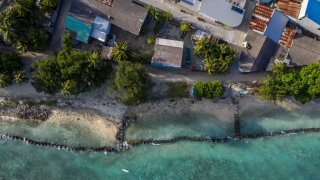
- The Maldives could disappear by the end of the century if the world does not act quickly, said the country's minister of environment, climate change and technology.
- Aminath Shauna told CNBC "there is no higher ground for us" as the country lies at risk from extreme flooding.
- The World Economic Forum has estimated that by 2050, 80% of people in the world will be impacted by climate change.
The Maldives could disappear by the end of the century if the world does not act quickly and cohesively to combat climate change, said the country's minister of environment, climate change and technology.
Speaking to CNBC Tuesday, Aminath Shauna said that if environmental damage continues at its current pace, the country "will not be here" by 2100. "We will not survive," she said.
Get Boston local news, weather forecasts, lifestyle and entertainment stories to your inbox. Sign up for NBC Boston’s newsletters.
"Climate change is real and we are the most vulnerable country in the world," Shauna told "Capital Connection" speaking from Male. "There's no higher ground for us ... it's just us, it's just our islands and the sea."
The World Economic Forum has estimated that by 2050, 80% of people in the world will be impacted by climate change. Meantime, scientists suggest sea levels could rise by as much as 1.1 meters by 2100.
If such predictions ring true, the South Asian archipelago state famed for its island living could be among the most adversely effected.
Money Report
Today, 80% of the country's 1,190 islands are just a meter above sea level, making them particularly vulnerable to rising sea levels. Already, 90% of the islands have reported flooding, 97% shoreline erosion, and 64% serial erosion, Shauna said.
"Our income and our food and our survival depends on how we address these vulnerabilities today. The future of our country, the future of our people, the future of our culture — it all depends on our action today."
The Maldives has already introduced several adaptive measures to minimize the impact of climate change, such as coastal protection tools and community programs to promote resilience, Shauna said. But more than that, the country wants to become a "leader in mitigation efforts," like reducing greenhouse gas emissions.
"We want to lead in the effort and to say that if the Maldives can do it, then the entire world can do it as well," said Shauna, calling on individuals and governments to step up.
Last year, the Maldives released updated targets to reduce 26% of its emissions and achieve net zero carbon emissions by 2030. Such progress won't happen without international collaboration though, she said.
"We need every single person in the world to address climate change at a personal level, and at a political level by governments," said Shauna. "Ambitious targets are urgently needed to help not just the Maldives but all small island states."






